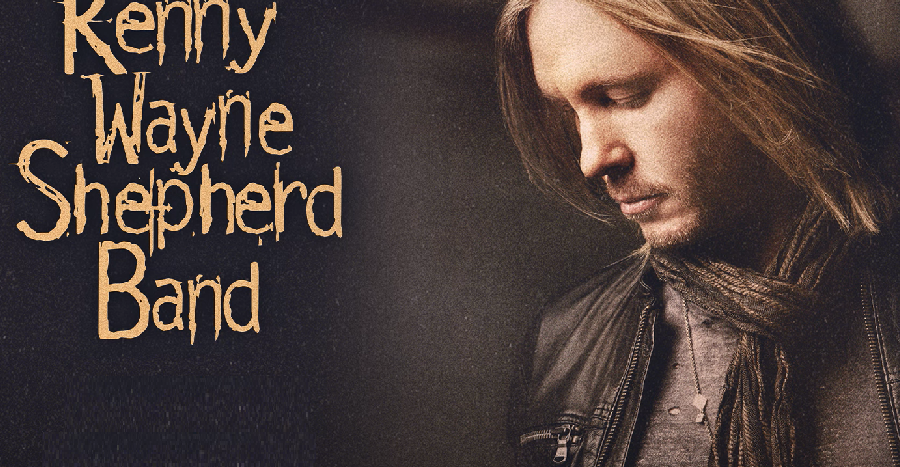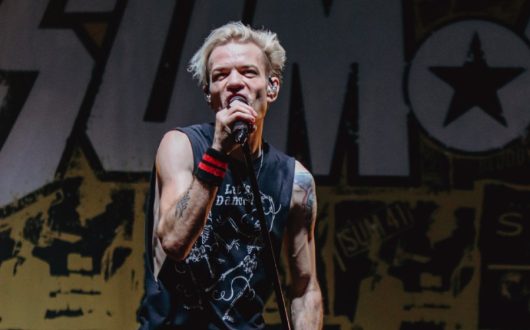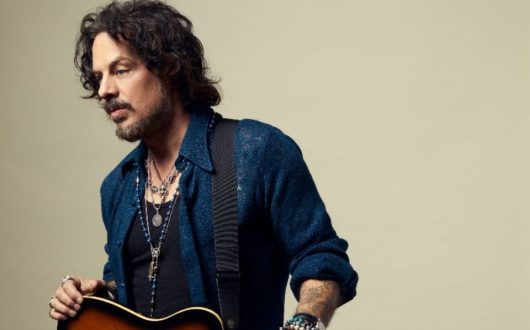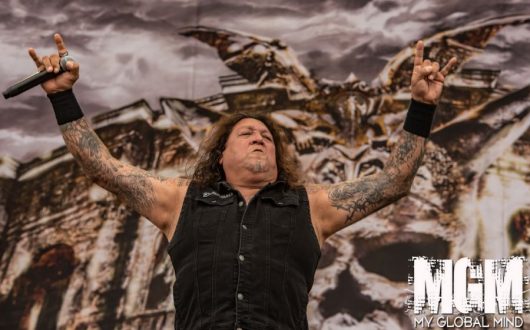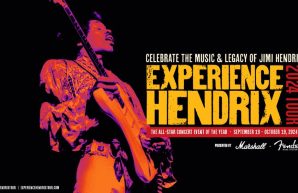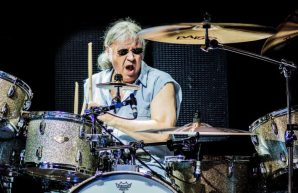Interview by Mark Lacey
Kenny Wayne Shepherd talks about his forthcoming UK tour, and shares memories from re-recording his iconic album ‘Trouble Is’, and teases fans with (at least) two new album releases on the way.
Born in Louisiana, and son to a radio DJ, it was perhaps inevitable that Kenny Wayne Shepherd would enter the music industry. Thirty years into a career that has seen chart and touring success, he finds himself at the top of his game. Having just re-recorded his iconic second album, ‘Trouble Is’, his global tour is a nostalgic trip down memory lane for older fans, whilst winning a whole new legion too.
MGM: People have described your music as a mix between country, blues and US rock, but how would you categorise it?
We were actually talking about that this morning. We try to combine the raw emotion and feeling of blues music with the excitement of rock and roll, and we wind up somewhere in the middle of those two genres. We can do either one 100% at any given time. I mean, I can play traditional 1-4-5 blues all night long, and I think that we were right up there with the best of them when it comes to that. And then we can just play some straight-ahead rock and roll too, and rock out with the best of them. But those are the two primary genres that have influenced my music the most. I grew up listening to all kinds of music, from blues to rock to country to gospel, funk, James Brown, things like that. And all that stuff finds its way into the music that I write and record.
MGM: You’re Louisiana born and bred, right? There’s a deep musical history down there; with everyone from Buddy Guy, Jerry Lee Lewis, Slim Harpo, and Louis Armstrong, and more.
I’m from Shreveport, Louisiana, and that’s where a lot of this music was born out of. A rich musical history and heritage comes out of my state of Louisiana and all the Mississippi Delta down there, especially when it comes to blues, which gave birth to rock and roll. So, there’s a direct lineage there as well.
MGM: You’re recognised as being a talented guitar player, but would you consider yourself more of a songwriter, or a guitarist these days?
My dad was a disc jockey and general manager of a multitude of radio stations throughout my life. He was constantly playing music everywhere we went. He was always listening to the radio to make sure things were going smoothly and people were doing their job, so I grew up around songs that were hit songs and had big choruses and things that would stick in your head. When I started writing my own music, I never wanted it to be just a platform to showcase my guitar. I wanted all my music to be very well rounded, to have great lyrics, tell a good story, have a killer melody, things that people would want to sing along to. And so that’s been my approach to music. There’s a lot of different guys over the years; Clapton probably being one of the greatest examples of a real guitar player who has had very well-rounded songs throughout his entire career.
MGM: You started from a really young age, and your first album was when you were 18. Did starting out so young make things harder?
I think it absolutely worked in my favour. I got my first little toy acoustic guitar with nylon strings at about age 4. I could play things like ‘Mary Had a Little Lamb’ or ‘Smoke on the Water’ on that. And then I got my first electric guitar at age 7, and that’s when I started focusing on really trying to play guitar. By the time I was 13, I got on stage for the first time. I did my first demos at age 14. I put my own band together at age 15 and started doing shows under my own name. And then by age 16, I signed my record deal. At 17, I recorded my first album and it came out just after I turned to 18. And we had a tremendous success with the first record, maybe surprising to some. Early on in my career, I didn’t start singing lead vocals in my own band until my fourth album. My thing was that when I played guitar, I could play beyond my years, but when I opened my mouth, I still sounded like a child. It was just a fact.
And guitar playing came much easier to me than singing at the time. I had other people sing lead vocals for a while. So, you would think, this guy’s young, he’s a teenager, people are calling him a blues artist and he’s a kid, and he doesn’t even sing. You would think that the odds were stacked against me. And then we put the first single out. It shot up to number 5 on the Rock Charts. The first album sold half a million copies very quickly, and went on to go platinum. But I think the fact that I was so young was a real benefit to me, because now I’m 45 years old and I have a career that’s over 30 years.
In what I do, the general consensus is you get better as you get older. There is no better practice than getting out there and performing with other people in front of other people and honing your craft that way, and I’ve been able to do it at a professional level now for a long time. I think it’s just made me a better player.
MGM: Your commercial success came quite early on, unlike maybe someone like Joe Bonamassa who took a lot longer to reach that same level of notoriety. Why do you think that was?
Everybody’s path is different, everybody’s situation is unique to them. Joe certainly has had an interesting career. He’s a friend of mine and we’ve known each other for a long time and so he saw my experience and I’ve seen his. I think they’re both impressive and significantly different experiences and stories. But we have come to the same end here where we’ve both made it to that place where people would consider us successful musicians, but albeit different paths. Mine was through radio, writing songs that were radio friendly, especially over here in the States, and the first single, ‘Deja Voodoo’ just shot up to number five on the rock charts, and then we followed up the success of the first album with ‘Trouble Is’, which sold millions of copies and had numerous top five radio hits. ‘Blue on Black’ sat at number one for so many weeks here in the US at that time that it set a record. So, I had a lot of success when radio stations would embrace this kind of music. Things have changed now and there’s not a lot of terrestrial radio here in the US that play this kind of music anymore. It’s different avenues that you have to pursue in order for your music to be heard nowadays.
Most artists, when they do an anniversary package like this, they just re-package the same record, maybe with different artwork or maybe some outtakes or something like that. We thought this was really significant for us, and we wanted to make a unique and compelling package. So, we went all out. We re-recorded the whole album; a similar version of it so that it sounds familiar, but as you listen to the whole album, you start to hear subtle changes that we made here and there. So, you’re having a unique new listening experience. Then we also included a new version of Bob Dylan’s song ‘Ballad of a Thin Man’ that we had recorded, but didn’t make it on the original record.
MGM: How did it feel going back into the studio 25 years later to re-record those songs? Was there anything that kind of surprised you or challenged you about re-recording them?
We weren’t really challenged, in a sense. We went in and we did two versions of this record, and we ended up finishing one of them and releasing it, and the other version is just not finished. But we approached it in two ways. One was very close to the original album, and that’s the one that we completed and released. The other version is like how the songs have changed in 25 years of live performances, where maybe the drums on the record are very straight, and then live the guy has started putting all these drum fills and these crashes in there, and maybe the solo or my rhythm part has evolved. But as we did that, and I started comparing the two, you started to realise that this is why some things that work in a live environment don’t necessarily translate as well to the studio environment. It works great on stage, because you got all that energy and that adrenaline, the audience is there and it seems like a great idea in the moment, but when you put it in the studio, everything can be analysed and it’s under a microscope….! For this record, the vibe was so important, and the further we got away from the sound of the original album, the more we started to lose the actual vibe in the studio. So that’s why we ended up going down the path of closely resembling the original. But there was nothing really that challenged us besides making sure that we captured the original vibe of the original record. The overall process was very nostalgic and we had the whole crew together. We had everybody except for James Cotton, who was Muddy Waters harmonica player. He played harmonica on the song ‘Long Gone’ on the original record, but he passed away several years ago. So, we brought Charlie Musselwhite in to play on this version and he’s a legend in his own right and he did an absolutely fabulous job. And then Tommy Shannon from Stevie Ray Vaughn’s band played bass on the original. But Tommy’s been retired for some time now, so we ended up using my bass player Kevin McCormick. We had Chris Layton and Reese Wymans from Double Trouble and Jerry Harrison from the Talking Heads that produced the original. We had basically the whole crew together going through this process all over again. The resounding opinion was that we did a fantastic job, and it still sounds totally relevant and could be released as a brand-new record today.
MGM: You’ve been out on tour to support this album, and you played your first show back in your hometown. The main set is the twelve songs off the original album, played in a different order. It doesn’t look like you’ve been playing that re-recorded Bob Dylan track in the set at the moment.
KWS: For some reason, it never crossed my mind when we were putting the show together. It wasn’t until very recently that somebody first asked me if we were doing that. I was like, oh my gosh, I didn’t even think about it. Currently we haven’t been performing that song, but otherwise we’re doing the entire album for the very first time ever live in concert. I’ve changed the order up; it makes for a better live experience. Some songs are extended versions where we stretch out solos and jam out for a while. Some of them are very similar to the album version. But we do the whole record, then we go off stage for an encore break. And when we come back out, we play almost a whole other set from various albums that we’ve put out in the last 25 years in case some people are reconnecting with us for the first time in a while and maybe missed some of this music. Or for people who might be there for their very first Kenny Wayne Shepherd concert, to give them a taste of the entire body of material that we have. It’s just been selling out everywhere here in the US.
MGM: It must bring about some quite interesting emotions for you to be able to play the album in its entirety?
The real flood of memories happened in the studio, because you’re analysing every part and you’re remembering how you did it originally, and all of these memories come flashing back. It was a great period in my life, making some really incredible music with some amazing musicians. But on stage it’s been a great experience. We’ve never played a whole album from start to finish, ever, so this has been a really good experience and the reaction from the fans has been overwhelmingly positive.
MGM: You’re playing quite a few songs from across your back catalogue in the second part of the set; songs like ‘Woman Like You’ and ‘I want you’. You’re also covering that BB King song ‘You done lost your good thing now’ that you recorded that maybe about ten years ago now.
Yeah, that was on the ‘Goin’ Home’ record. When I do covers, I like to pick the not so obvious ones, but obviously they’re by artists whose music has had an impact on me and people who I respect. We actually just went in the studio last October at the end of our tour, and we did a rock and roll version of that, covering lot of different rock bands that maybe you would not expect the Kenny Wayne Shepherd Band to do. We had a really good time doing that, and it will come out at some point. We have a whole new studio record that’s been ready to go now for some time that we finished right before COVID happened. And I’ve been holding on to that this whole time because it didn’t make sense to me to put out a new record if we couldn’t go out and tour. Hopefully it will come out later this year. And then maybe a year or two from now, we’ll get that rock and roll cover album put out as well.
MGM: You’re about to come over to tour the UK. The last time you were here was in 2019 pre-COVID. What are you most looking forward about those shows.
The first time I came over there, I was opening up for the Eagles when they first got back together on the ‘Hell Freezes Over’ tour. So, my first introduction to the UK and all of Europe was playing these football stadiums. We played the old Wembley Stadium, three or four nights in a row, in front of 80,000 people. But then we made one more trip on our own after that. And then there was a period of time where we didn’t come over for many years. We saw our friend Joe Bonamassa, who showed everybody that people are really into this music. Fans were sending us messages saying ‘you have fans here, come play for us’. And I was like, okay, we’re going to go play for these people. And we had to start building it from the ground floor and start building it up over there over time. I’ve done this before, I’ll do it again. Every time we came back, the crowd started getting bigger and the venues started getting bigger and you could feel the momentum behind what we were doing. In 2019 the shows were packed, and it was about to break wide open for us over there. We had a plan in place, and then obviously now it’s been almost three years since we had been able to come.
The fans there are really important to me because you guys represent a time in one of my favourite genres; blues music. There was a period of time where the mainstream audience here in the US turned their back on the blues and they moved on to something else. And people in the UK in particular, and European countries, really embraced the blues artists and gave them a home for their music. People like the Rolling Stones and Eric Clapton and Jeff Beck were singing the praises of people like Muddy Waters and Howlin’ Wolf and all these blues forefathers and giving them a home for their music and an audience. You guys helped keep this music alive when the majority of the people in the US really weren’t. I have a tremendous amount of respect for that, and that there’s always been a home for this music over there. So, we’re excited to come back and we’re excited to continue building on what we have been building over the previous years.
For more information:
www.facebook.com/kennywayneshepherd
The Kenny Wayne Shepherd band will be playing dates across the UK in April. For information and tickets:
www.kennywayneshepherd.net/tour
18th April: Parr Hall, Warrington
19th April: Queens Hall, Edinburgh
20th April: Tyne Theatre, Newcastle
21st April: Picturedrome, Holmfirth
22nd April: De La War Pavilion, Bexhill-on-Sea
23rd April: Shepherd’s Bush Empire, London

